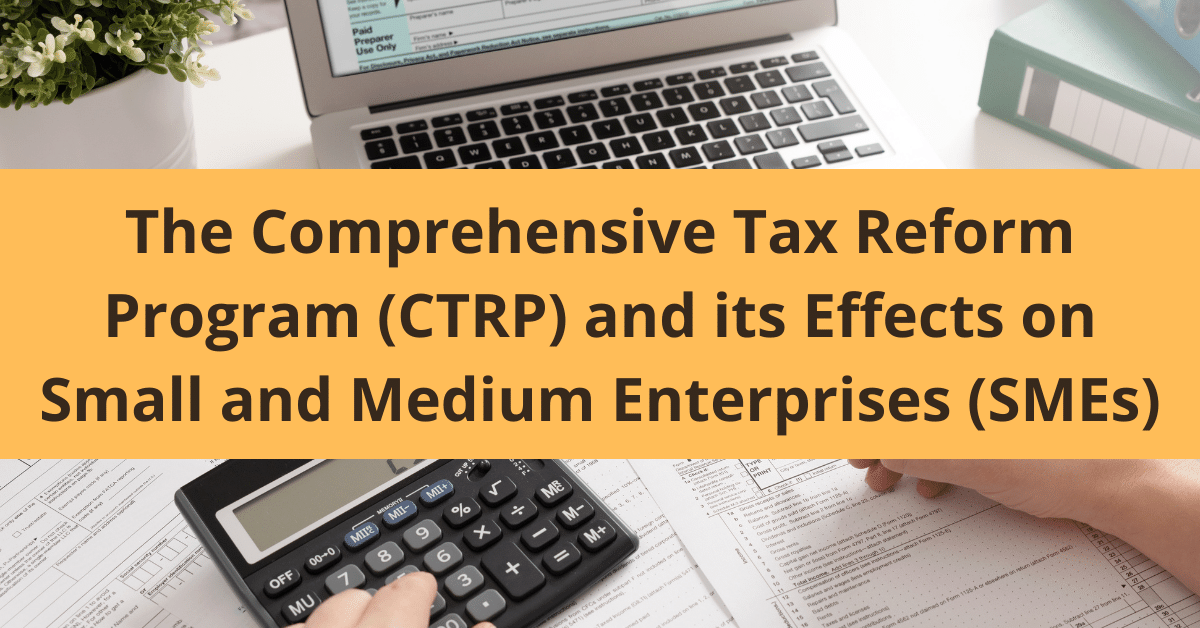The Comprehensive Tax Reform Program (CTRP) and its Effects on Small and Medium Enterprises (SMEs)
If you have been paying taxes regularly, you may be familiar with the TRAIN law or the Tax Reform for Acceleration and Inclusion Act and a couple of tax amnesty programs, which the Bureau of Internal Revenue (BIR) has implemented since 2018.
Speaking of this new tax scheme, did you know that the TRAIN law is only one out of the four tax packages included in the Comprehensive Tax Reform Program or CTRP?
As business owners, it important that we know and understand the basics of the CTRP, especially the tax packages that go with it. It helps us get the bigger picture in order to avoid problems with our tax compliance in the future.
What is the Comprehensive Tax Reform Program (CTRP)?
The need to quickly address poverty reduction and social and economic inequality are pressing issues in the country. Thus, the government, through the Department of Finance and the Bureau of Internal Revenue (BIR), implemented the CTRP to make the tax process fairer, simpler, and more efficient.
What are the four major tax packages included in CTRP?
As part of the country’s long-term vision, there are four major tax reform packages that business owners should know and implement when paying their taxes.
1. Tax Reform for Acceleration and Inclusion Act
The TRAIN Act seeks to provide equitable relief to a majority of taxpayers and their families, increase the level of their disposable income and promote economic activity, among others. Some of the significant changes in tax exemptions and rates are the following:
- Annual income of P250,00 for individual taxpayers is exempted from personal income tax;
- Businesses with annual gross sales of 3 million pesos or below may opt to pay a flat rate of 8% based on their gross sales;
- Increased in Value-added tax (VAT) threshold from 1.9 million pesos to 3 million pesos;
- Implementation of the Tax Amnesty Program.
2. Corporate Recovery and Tax Incentives for Enterprises Act
The CREATE Act primarily grants tax relief to corporate taxpayers with a considerable reduction of the Corporate Income Tax (CIT) rate to 20%, from 30%. Here are some notable provisions of the CREATE Act:
- Lowered corporate income tax to a minimum of 1-2%;
- No tax is levied on foreign-sourced dividends received by domestic corporations, provided such earnings are invested in the Philippines;
- Incentive system based according on industry and location tiers.
3. Real Property Valuation Reform (RPVR)
The RPVR package is envisioned to provide a more equitable real estate property evaluation system, improving tax collections in the country without increasing tax rates.
The salient features of this tax package include the adoption of international standards in the valuation of real property, the establishment of a single valuation base for taxation of real property, and the formation of a Property Valuation Service to oversee and manage valuation-related concerns of local governments.
4. Passive Income and Financial Intermediary Taxation Act (PIFITA)
The PIFITA includes these major provisions: a 15% income tax rate on passive income such as interest income, dividends, and capital gains, removal of initial public offering (IPO) tax, and no documentary stamp required on non-monetary transactions.
How does the CTRP affect SMEs?
With lowered taxes and an efficient tax process, here are some of the benefits you and your company may benefit from the CTRP:
1. Additional funds to grow your business
The latest tax packages have the largest income tax reduction in the history of Philippine taxation. With fewer taxes paid to the government, you’ll have more resources to spend on growing your business, like expanding your branches or adding more product lines.
2. Competitive business climate
The country has the highest Corporate Income Tax (CIT) rate in the ASEAN region, making it hard for foreign investors to come to the Philippines.
However, foreign companies will invest more in the country with the reduced CIT rate. The vibrant economy would create new opportunities for local businesses.
3. Transparency in real property valuation
If you are engaged in the real estate business, you are guaranteed enhanced transparency in the valuation of your properties, doing away with random or exorbitant property valuation.
4. Helps government in creating jobs for Filipinos
The reduced income taxes would allow you and your company to allocate funds for human resources to support your business expansion due to a more tax-friendly business environment. Creating more job opportunities was a priority project of the previous administration.
Looking Ahead
The Comprehensive Tax Reform Program (CTRP) promises a better economic climate for the Philippines in the next few years.
The new tax system affects every taxpayer in the country, especially small businesses and SMEs. Staying updated on the changes in your tax obligations is essential to manage your finances better and remain compliant with tax laws.
If you are struggling with the implementation of the recent tax reform program, we can help you confidently pay and file your taxes correctly following the provisions of the CTRP. Feel free to email us at info@djkaaccounting.com for more details.
Related Posts
Recent Posts
- How to Process the Sworn Declaration Required by BIR for Electronic Marketplace Sellers
- Understanding Tax Compliance for e-Marketplace Businesses
- Who Needs to Submit GIS to the SEC?
- Understanding these Financial Ratios for Business Decision-Making Purposes
- What you Should Know about the Ease of Paying Taxes Act





